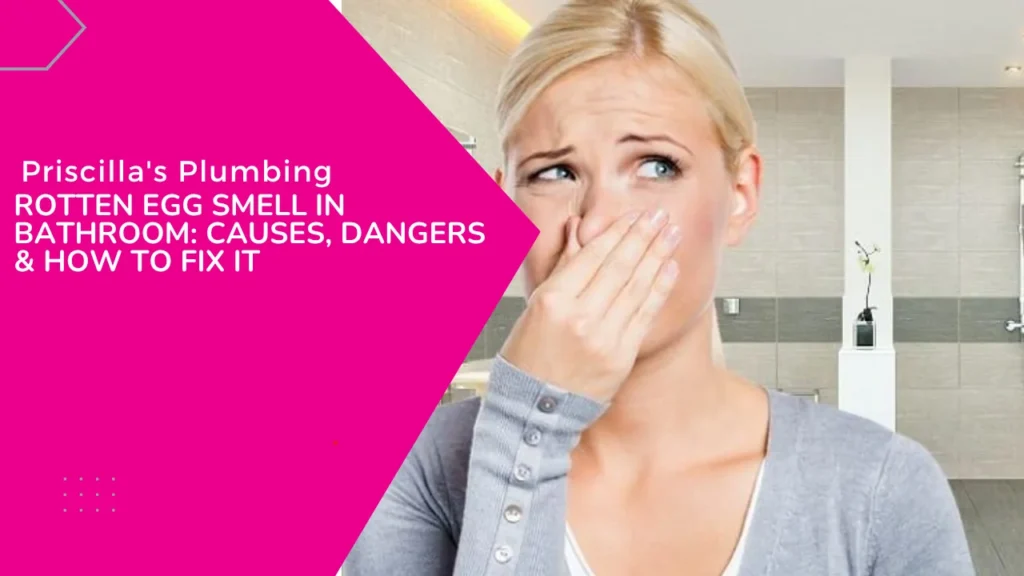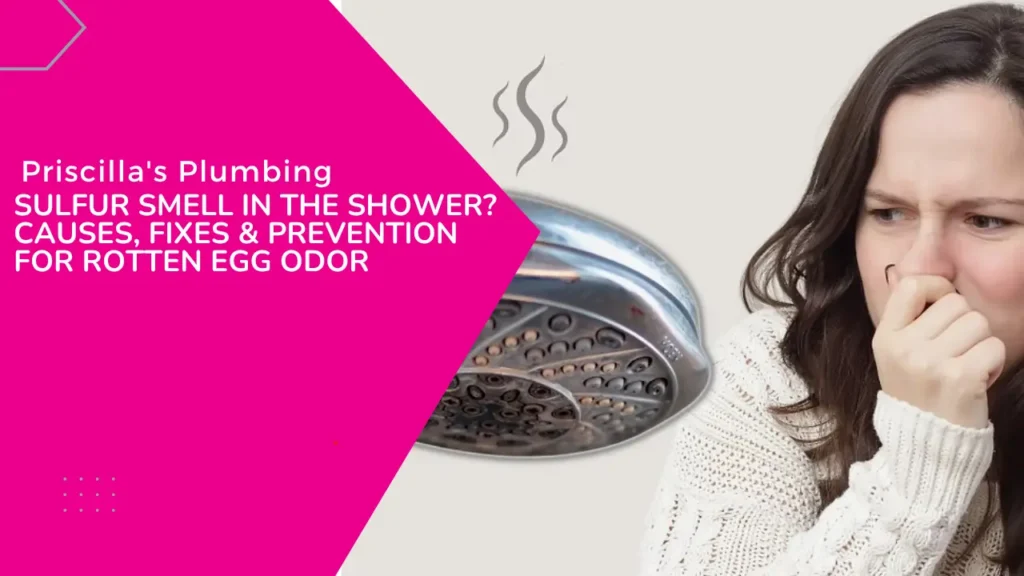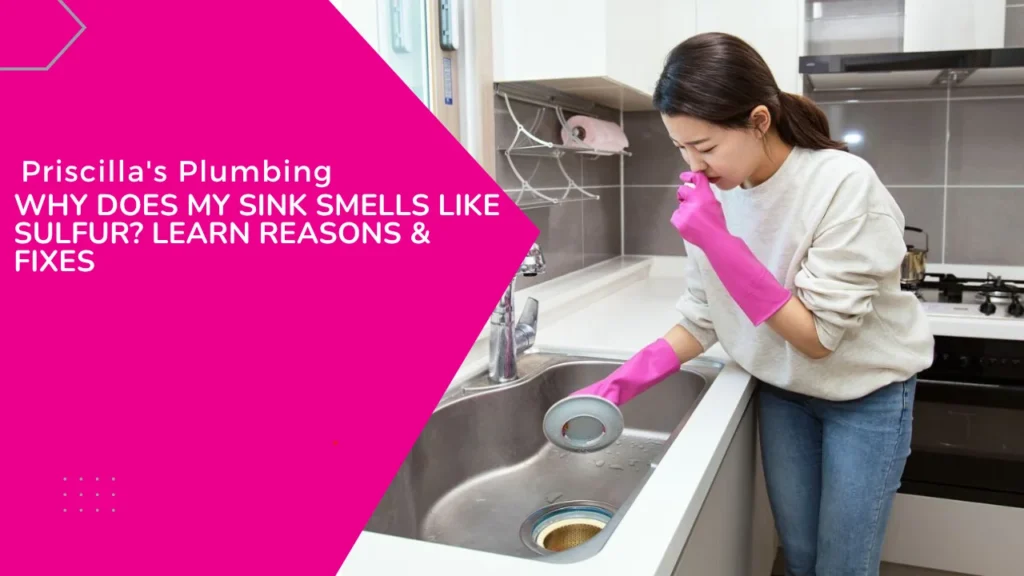A persistent rotten egg smell in a bathroom is usually caused by hydrogen sulfide gas, a sulfur-based compound produced by bacteria in drains, sewage, or water heaters. Have you ever walked into your bathroom and noticed a strong, strange odor? At first, it may seem like a small problem, but that smell can quickly make you wonder if something more serious is going on. Many homeowners describe it as a rotten egg smell in the bathroom, and while it’s unpleasant, it can also be a warning sign.
In Pompano Beach, this smell might come from several sources. Sometimes it means a gas leak with an added odorant; other times, it could be sewer gas seeping through a dry drain trap, or even sulfur bacteria growing inside a water heater. If you have the smell in your complete home, then read about rotten egg smell in house causes and solutions.
In this blog, we’ll break down the possible causes, how to check them safely, and when to call a professional for help.
Why Does My Bathroom Smell Like Rotten Eggs?
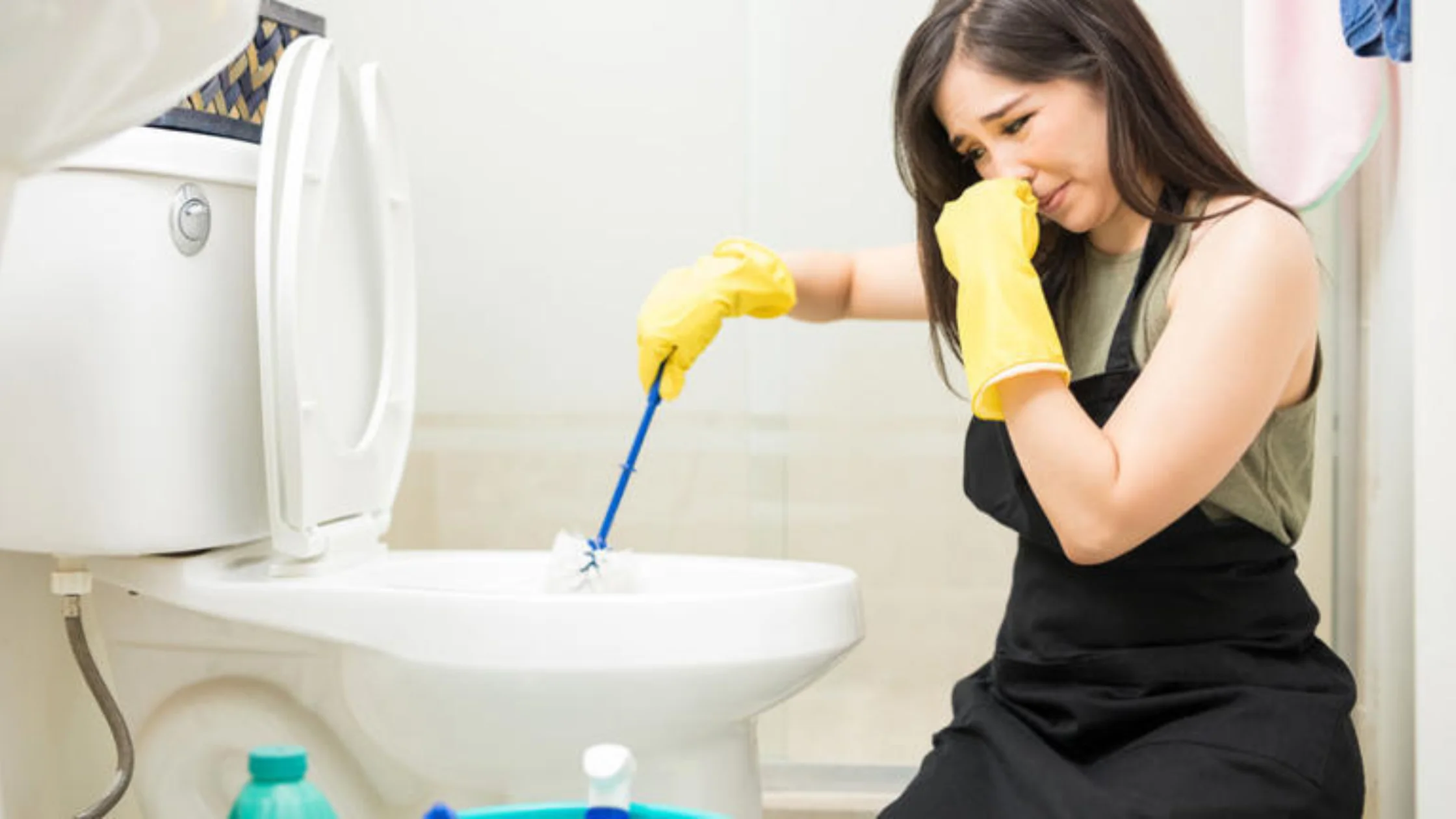
A bathroom that smells like rotten eggs is more than just unpleasant; it’s a warning sign that something is wrong in your home. Sometimes the odor indicates a serious gas leak, while at other times it originates from sewer gases, clogged drains, or even your water heater. Knowing the difference matters because some causes are simply inconvenient, while others can be dangerous.
Natural gas and propane are normally odorless, but companies like Florida Public Utilities add mercaptan, a chemical with a sulfur or skunk-like smell, so leaks can be detected quickly. If the smell is strongest near gas appliances, treat it as an emergency: leave immediately, avoid electronics or open flames, and call 911 or your utility provider from outside.
If the smell isn’t related to a gas leak, it may be coming from other sources inside your bathroom and creating a sulfur odor in the bathroom spaces:
- Dry P-trap: A U-shaped pipe located under sinks and tubs prevents sewer gas from entering the home. If it dries out, gases escape inside. Running water for a few minutes usually resolves the issue.
- Sewer gas leak: Cracked pipes or blocked roof vents can allow hydrogen sulfide and methane to enter the room, causing a strong sewage odor in bathroom drains. These gases can cause headaches, nausea, or dizziness with prolonged exposure.
- Water heater problems: If the smell appears only with hot water, sulfur bacteria may be reacting with the anode rod inside the heater. Replacing it with an aluminum-zinc rod is a common solution.
- Clogged or dirty drains: Organic buildup can rot and release foul odors. For thorough cleaning, try our expert drain cleaning Pompano Beach service.
- Nearby garbage disposal: Food waste stuck inside may produce the same smell, especially in open-concept bathrooms.
What You Should Do Right Away
- Rule out a gas leak first: If you suspect a gas leak, leave your home immediately and call for help.
- Check drains for a dry trap: Run water and add a tablespoon of mineral oil to slow evaporation.
- Test hot vs. cold water: If only hot water smells, your water heater may be the source of the issue.
- Ventilate the bathroom: Open windows or use fans to reduce exposure.
- Call a licensed plumber: If odors continue, schedule a professional inspection. In Pompano Beach, plumbers frequently utilize smoke tests and cameras to locate hidden leaks.
A rotten egg smell in your bathroom may not always be life-threatening, but if your bathroom drain smells like sulfur, it’s a sign you should never ignore. Acting quickly can protect your family’s health and prevent costly repairs.
How to Diagnose the Source of Rotten Egg Smell in My Bathroom?
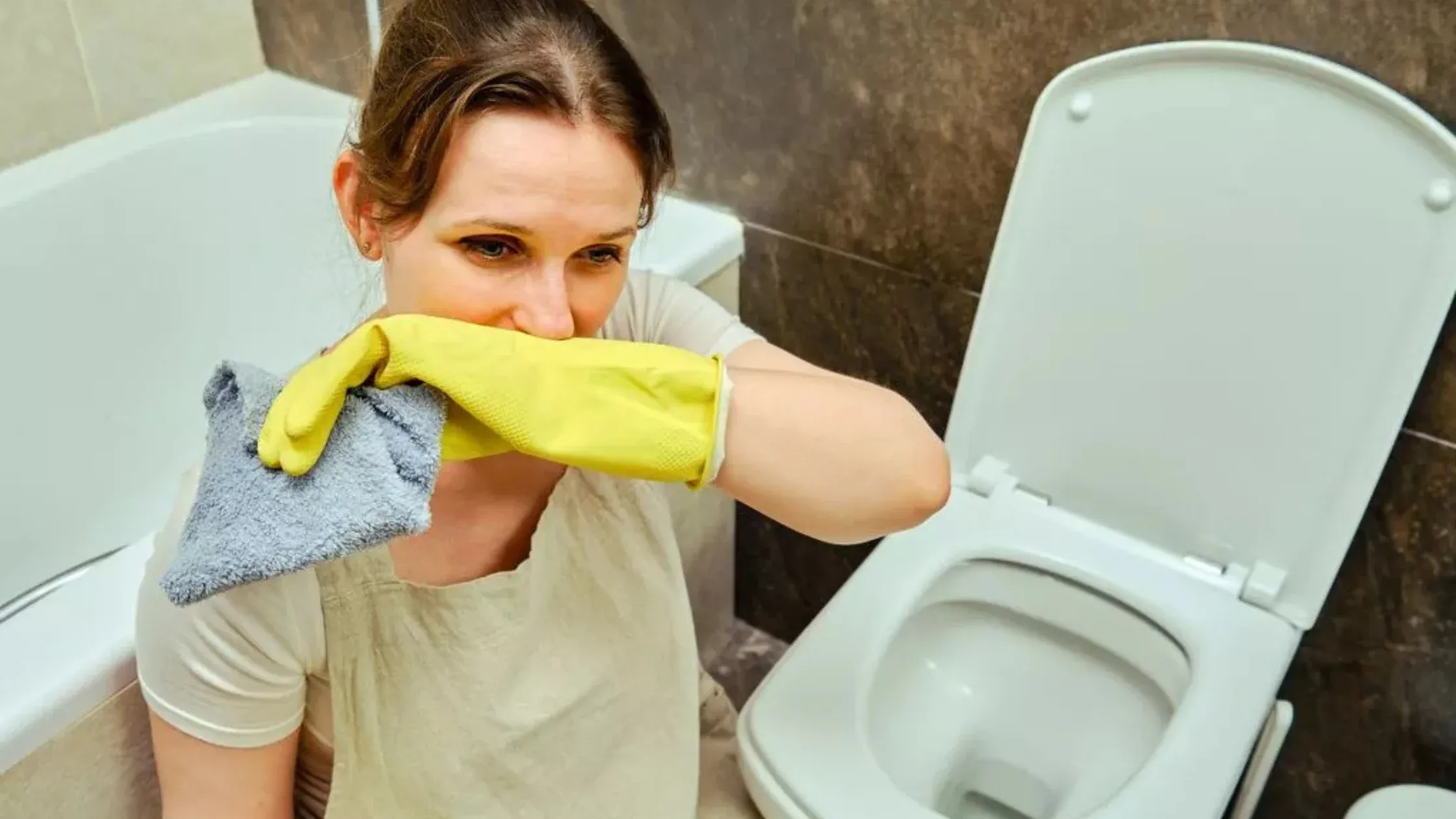
Finding the source of a rotten egg smell in the bathroom can feel tricky, but a few simple checks can help you narrow it down before calling a professional. The key is to test one area at a time so you can rule out possibilities.
Step 1: Isolate the Smell
- Hot vs. Cold Water Test: Run both taps. If only hot water smells, the issue may be inside your water heater. If both smell, it’s more likely in the supply or the drains.
- Single vs. multiple drains: If the odor is coming from only one drain, focus your inspection on that drain. If several drains smell, the problem may be in the main sewer line or vent.
Step 2: Test Your Drains
- Biofilm check: Shine a flashlight into the drain. A slimy buildup on the sides can trap bacteria that release hydrogen sulfide, creating a strong sulfur odor in bathroom fixtures.
- DIY Flush: Pour a cup of baking soda, followed by a cup of vinegar. Wait 10 minutes, then rinse with boiling water. This often removes minor buildup.
- Aerator inspection: If a sink smells, remove the faucet aerator and soak it in vinegar. Bacteria can hide inside and release odor when water flows.
Step 3: Check for Air Leaks
- Toilet base test: Gently rock the toilet. If it moves, the wax ring seal may be damaged, allowing sewer gases to escape. This is one of the most common reasons for a bad egg smell in bathroom areas.
- Pipe gap inspection: Look for open spaces where pipes enter walls or floors. Small leaks here can let smells seep into your bathroom.
Step 4: Inspect Plumbing Vents
Bathrooms rely on roof vents to carry gases out. If the vent is blocked by leaves, bird nests, or storm debris, the smell may push back inside. Warning signs include gurgling drains or odors that appear after flushing. For your help, we specialize in cast iron plumbing Pompano Beach repairs.
Step 5: Watch for Bigger Issues
- Sewer line blockage: If multiple drains smell and water drains slowly, your main line could be partially clogged.
- Hidden leaks: Damp spots, discoloration, or musty odors near walls may indicate leaking pipes that require professional repair. Our certified water leak detection Pompano Beach experts can find hidden leaks quickly.
Pro tip for Pompano Beach homeowners: After heavy rain or storms, it’s common for roof vents to clog and for unused bathroom traps to dry out. Adding “vent check” and “run unused drains” to your seasonal home checklist can help prevent future odors.
How Do I Get Rid of a Rotten Egg Smell in My Bathroom?
Getting rid of a rotten egg smell in the bathroom isn’t just about masking the odor; it’s about removing the source so it doesn’t come back. Beyond the common fixes, there are several overlooked areas that homeowners in Pompano Beach should check.
1. Flush the Overflow Channels
Most sinks have a hidden overflow channel that prevents spills from occurring. Over time, soap scum and bacteria collect inside, creating sulfur odors that can be mistaken for the smell of a bathroom drain that smells like sulfur. Pour a mixture of hot water and bleach or hydrogen peroxide into the overflow opening to sanitize it..
2. Deep-Clean Shower and Tub Drains
Even if drains look clear, biofilm (a slimy layer of bacteria) can stick to the sides. Use a long, flexible drain brush to scrub the inside of the drain before flushing with boiling water. This step is essential for preventing recurring sewage smell in bathroom drains.
3. Inspect Toilet Seals and Gaskets
It’s not only the wax ring at the base that can fail. Toilets also have tank-to-bowl gaskets and bolt seals that may wear out, letting sewer gases seep in. If you notice rocking or small leaks, these seals may need to be replaced.
4. Address Ventilation Problems
Poor airflow can trap odors in bathrooms even after the source is gone. Check that your bathroom exhaust fan is working properly, vents are clear of dust, and humidity levels are under control. In coastal Florida, high humidity accelerates bacterial growth in drains and vents.
5. Consider Professional Drain Maintenance
If the smell returns regularly, it may be time for a professional smoke test or a camera inspection. In Pompano Beach, plumbers often use these methods to pinpoint cracks, hidden clogs, or vent blockages that DIY solutions can’t reach.
Local tip: Due to our humid, storm-prone climate, bathrooms in South Florida homes are more likely to develop drain biofilm and vent issues compared to drier regions. Regular seasonal maintenance (like running unused drains and checking fans) helps prevent recurring odors.
When to Stop DIY Fixes and Call a Professional?
While some odor issues have quick fixes, there are times when it’s best to stop troubleshooting and bring in an expert. A persistent rotten egg smell in the bathroom often signals something deeper that simple cleaning can’t resolve.
Signs It’s Time to Call a Licensed Plumber
- Gas-Like Odor Near Appliances: This can indicate a natural gas leak. Leave your home immediately and call your utility provider before contacting a plumber.
- Recurring Odors after P-trap Refill: If the smell returns quickly, there may be a cracked pipe or hidden leak.
- Toilet Base Odor: A failing wax seal or gasket allows sewer gases to escape into the bathroom, resulting in a foul smell.
- Multiple Drains Smelling at Once: This often points to a blocked roof vent or a main sewer line issue.
In Pompano Beach, the city recommends contacting a plumber if your P-traps are full and the odor still lingers. Professionals utilize specialized tools, such as smoke tests, drain cameras, and vent inspections, to identify issues that homeowners may not be able to detect.
At this stage, having a trusted local plumbing service makes all the difference. That’s where Priscilla’s Plumbing comes in, offering expert solutions tailored to South Florida homes.
Why Choose Priscilla’s Plumbing for Rotten-Egg Bathroom Odors?
When simple fixes no longer work and the odor persists, that’s when it’s time to call in a professional. Many homeowners try DIY solutions but still struggle with persistent sulfur smells from drains, toilets, or water heaters. The problem is that these issues are often hidden deep within your plumbing system, such as a cracked pipe, a blocked vent, or bacteria inside the water heater, that no amount of vinegar or bleach can permanently solve.
At Priscilla’s Plumbing, we provide the solution. Using tools such as smoke testing, video camera inspections, hydro-jetting, and water heater repair, we identify the true source of the rotten egg smell and eliminate it for good. As a local, licensed, woman-led, and family-owned company in Pompano Beach, we’re available 24/7 to handle emergencies and restore your home’s safety.
- Fast 24/7 Response: We respond to inquiries from our customers as soon as possible.
- Advanced Plumbing Solutions: From drain cleaning to water heater repairs, we employ the most effective method for your specific issue.
- Trusted Local Team: Four generations strong, built on honesty, skill, and customer trust.
If you’re smelling rotten eggs in your bathroom, call us now at (954) 787-2052 or schedule online. We’ll take care of it quickly, safely, and permanently. Contact our expert plumber Pompano Beach team for fast help.
Conclusion
A rotten egg smell in the bathroom should never be brushed off as a minor nuisance. Whether it’s a simple dry P-trap, a clogged vent, or something more serious, such as a gas leak or a sewer line issue, prompt action is crucial for keeping your home safe and healthy. You now know the common causes, simple fixes, and warning signs that indicate it’s time to call a professional.
At Priscilla’s Plumbing, we’ve helped countless Pompano Beach homeowners eliminate stubborn odors for good using the right tools, advanced diagnostics, and trusted local expertise.
Don’t wait until a small smell becomes a major problem. Call us today at (954) 787-2052 or schedule service online, and let us restore fresh, clean air to your home.
FAQs
Q1. Why does my bathroom smell like rotten eggs only sometimes?
A rotten egg smell in the bathroom that comes and goes is usually caused by a dry P-trap or blocked vent. When the trap loses water or airflow is restricted, sewer gases can seep inside intermittently. Regularly running water in drains and having vents inspected helps prevent the return of this sulfur odor.
Q2. Does a rotten egg smell always mean there’s a gas leak?
Not always. While natural gas leaks are often odorized with mercaptan to smell like rotten eggs, other issues, such as sewer gas, clogged drains, or water heater bacteria, can also cause the same odor. If the smell is strongest near appliances, treat it as a potential gas leak, evacuate the area, and call your utility company immediately.
Q3. Can sulfur odors in bathroom drains be a plumbing issue?
Yes, a sulfur odor in bathroom drains often indicates biofilm, clogs, or venting problems that allow sewer gas to escape. If basic cleaning doesn’t solve the smell, a plumber can perform a smoke test or camera inspection to find the underlying issue before it becomes a bigger problem.
Q4. Is it safe to stay in the house if the bathroom smells like rotten eggs?
It depends on the cause. Sewage smell in bathroom drains may just be unpleasant, but a gas leak is an immediate danger. If the odor is strong near appliances, leave your home right away. For recurring or unexplained odors, call a licensed plumber for a safe inspection.
Q5. How can I eliminate the odor of sulfur from my bathroom drain?
Start by cleaning the drain with a mixture of baking soda, vinegar, and boiling water to remove bacteria and buildup. Refill any dry P-traps with water plus a tablespoon of mineral oil. If odors persist, professional services such as hydro-jetting or vent inspections may be necessary to clear sewer gases from your plumbing system.
Q6. Why does only the hot water smell like rotten eggs?
If the bad egg smell in the bathroom appears only when using hot water, the culprit is usually your water heater. A corroded magnesium anode rod reacts with bacteria, releasing hydrogen sulfide gas. Replacing it with an aluminum-zinc or powered anode rod often solves the issue.
Q7. Can the sewage smell in the bathroom come from the toilet base?
Yes. A broken or deteriorated toilet wax ring allows sewer gas to escape at the base of the toilet, creating a foul odor in your bathroom. If you notice rocking, leaks, or a persistent odor around the toilet, the seal likely needs to be replaced by a plumber.





